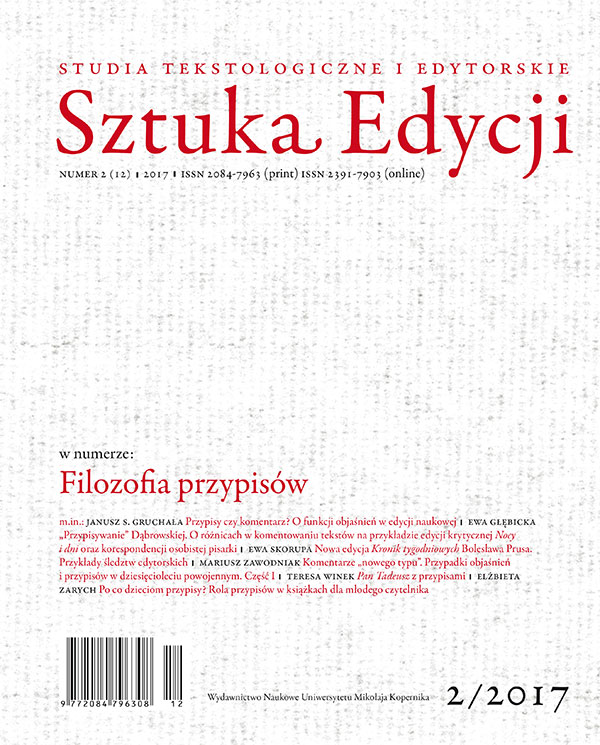Bolesław Prus in footnotes and addenda. Case study
DOI:
https://doi.org/10.12775/SE.2017.0017Keywords
Bolesław Prus, comments, footnotes, reality of a period, author’s mistakes, editor’s choicesAbstract
Based of the examples drawn from selected compositions by Bolesław Prus, the article demonstrates a variety of problems related to preparing explanations concerning the works of the 19th century writer. Among them, there are various types and levels of details in footnotes, adjusted to the needs of a contemporary reader, or the matter of marking and rectifying the author’s mistakes (the state of knowledge at that time, deformations of quotations, anachronisms). It is also discovering non-obvious relations between the element of the world being explained and the plot, as well as marking traces of the writer’s private world preserved in a literary composition (such as recurring ideas and motifs, biographical elements, references to own or others’ texts: readings, creative notes etc.). While preparing an edition of a text by Prus (in case of both journalistic writing and belles-lettres), an editor faces the necessity to define the hierarchy of values, to make a difficult choice between informing about the reality of a given period and emphasizing the creator’s specific experiences, marking the border in using the information taken from the writer’s biography, between objective and subjective information. He or she also has to beat the temptation to overload the text with footnotes, supplementing or explaining each sentence – in order not to fall into the “paranoia of footnotes”.
References
Górski K., 2011, Tekstologia i edytorstwo dzieł literackich, wyd. 3 popr. i uzup., Toruń.
Ilmurzyńska H., Stepnowska A., 1965, Księgozbiór Bolesława Prusa, Warszawa.
Loth R., 2006, Podstawowe pojęcia i problemy tekstologii i edytorstwa naukowego, Warszawa.
Machnicka V., 2011, Archaizmy leksykalne i frazeologiczne w „Kronikach” Bolesława Prusa, Siedlce.
Peryfrazy Bolesława Prusa, 2011, Siedlce.
Prus B., 1985, Farys, w: Programy i dyskusje literackie okresu pozytywizmu, oprac. J. Kulczycka-Saloni, Wrocław.
Prus B., 1962, Kroniki, t. 12, oprac. Z. Szweykowski, Warszawa.
Prus B., 1963, Kroniki, t. 13, oprac. Z. Szweykowski, Warszawa.
Prus B., 1970, Kroniki, t. 20, oprac. Z. Szweykowski, Warszawa.
Prus B., 1998, Lalka, oprac. J. Bachórz, BN I 262, wyd. 2, Wrocław.
Prus B., Materiały do powieści Przemiany (notatki twórcze: BPW 158 IV, IBL Zb. Wł. 69; maszynopis: BPW 159 II).
Prus B., 2017, Notatki o kompozycji 1886–1889, oprac. A. Martuszewska i M. Kreft, Warszawa–Lublin.
Prus B., Notatnik XIV (BPW 139 I (14)).
Prus B., Pisma wszystkie. Humoreski, nowele, opowiadania, t. 5: 1878–1879, pod red. A. Bąbel, Warszawa–Lublin [w druku].
Prus B., 2016, Pisma wszystkie. Powieści: Dzieci, oprac. i wstęp A. Grabowska-Kuniczuk, Warszawa–Lublin.
Prus B., 2016, Pisma wszystkie. Powieści: Pałac i rudera. Dusze w niewoli, t. 1, oprac. A. Kuniczuk-Trzcinowicz oraz E. Paczoska i M. Nicińska, Warszawa–Lublin.
Prus B., Pisma wszystkie. Powieści: Przemiany, oprac. i wstęp A. Bąbel i A. Grabowska-Kuniczuk, Warszawa–Lublin [w druku].
Prus B., 1936, Przemiany (Nowele, opowiadania, fragmenty t. 5), Pisma Bolesław Prusa, t. 26, pod red. I. Chrzanowskiego i Z. Szweykowskiego, Warszawa.
Prus B., 2013, W Warszawie. Wybór z „Kronik”, t. 1–3, wybór i wstęp S. Sandler, oprac. A. Bąbel i A. Grabowska-Kuniczuk, Warszawa.
Trzynadlowski J., 1978, Edytorstwo. Tekst, język, opracowanie, wyd. 2, Warszawa.
Downloads
Published
How to Cite
Issue
Section
Stats
Number of views and downloads: 1188
Number of citations: 0



